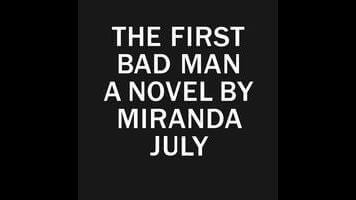Miranda July’s The First Bad Man is the first great novel of 2015

Considering Miranda July’s vast and varied resume, it seems odd that she hadn’t released a novel until now—though she’s been plenty busy making films (Me And You And Everyone We Know, The Future), writing short stories (collected in the excellent No One Belongs Here More Than You), and doing various unclassifiable projects (an email chain letter, an app). She’s the type of artist—word used with confidence and sincerity—who tends to be dismissed (or worse, backhandedly complimented) as “quirky,” but whose work is tied together by her singular, confident, multifaceted voice. Her characters are often unusual and under-confident; her writing is always the former and never the latter.
The First Bad Man, July’s debut novel, tells the story of an outwardly boring person whose interior life is a mosaic of delightful neuroses and staggering self-doubt. Cheryl Glickman is a fortysomething not-quite-old maid who lives a tidy, tightly controlled, borderline-OCD existence. Her sex life is limited to fantasies about an older man who’s connected to the place where she works, a hippy-dippy company called Open Palm that specializes in self-defense classes for women. (July’s own parents launched a publishing company the year she was born that sold, among other things, books on “internal martial arts.”) Cheryl’s desire for a family is expressed in a detailed fantasy about an imagined soulmate with an unusual name—Kubelko Bondy—she’s convinced she met as a child, and who she sees on occasion in the faces of people she meets. She’s a lonely, anxious person whose mind you wouldn’t want to inhabit, but who’s also far more complex than she appears. Like the lead characters in both of July’s feature films—both played by July—Cheryl is an odd puzzle just waiting for the right human connection to help her sort her life out.
When a houseguest of indeterminate length is thrust upon her—Clee, the surly, grown daughter of her bosses—Cheryl heads into an interior panic, and July’s description of her main character’s state of mind is both funny and heartbreaking. She sizes up her new roommate: “She was much older than she’d been when she was fourteen. She was a woman. So much a woman that for a moment I wasn’t sure what I was.” What starts as an imposition turns flat-out hostile, the entitled younger woman acting like a predator whose chief prey is pushovers. The relationship turns physical in unexpected ways: not sexual or abusive, exactly, but also a little bit of both. And though that might sound like a dark turn for one of July’s stories—which tend to read like skewed but ultimately sweet fairy tales—it isn’t, not really. Instead, it’s another way for July’s damaged but ultimately redeemable characters to relate to each other and the world, and the beginning of a small story that she spins into something just a little bit larger than life. It’s quirky, yes, but also beautifully worded, emotionally complex, impressively but quietly insightful, and, in the right light, so, so funny.